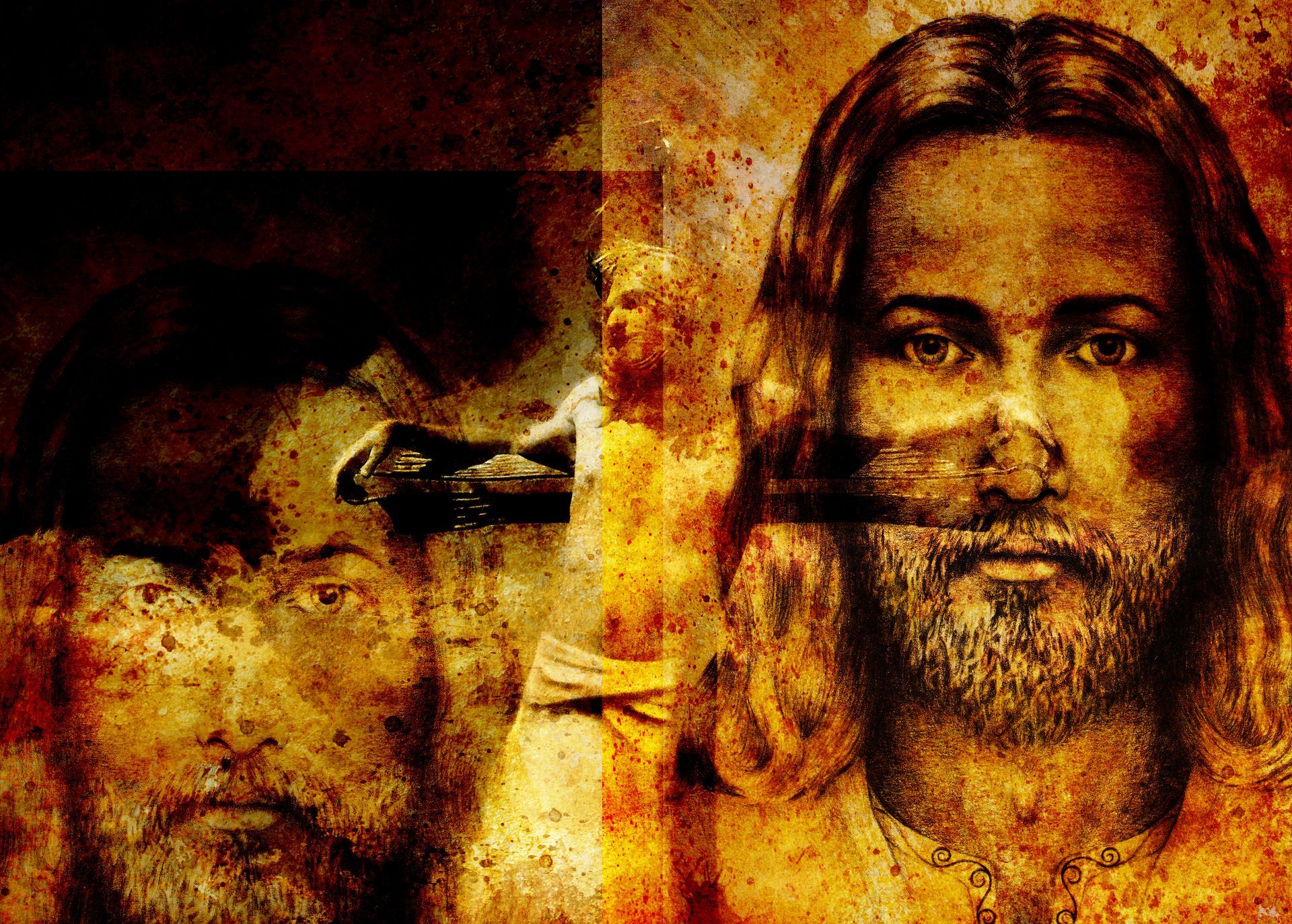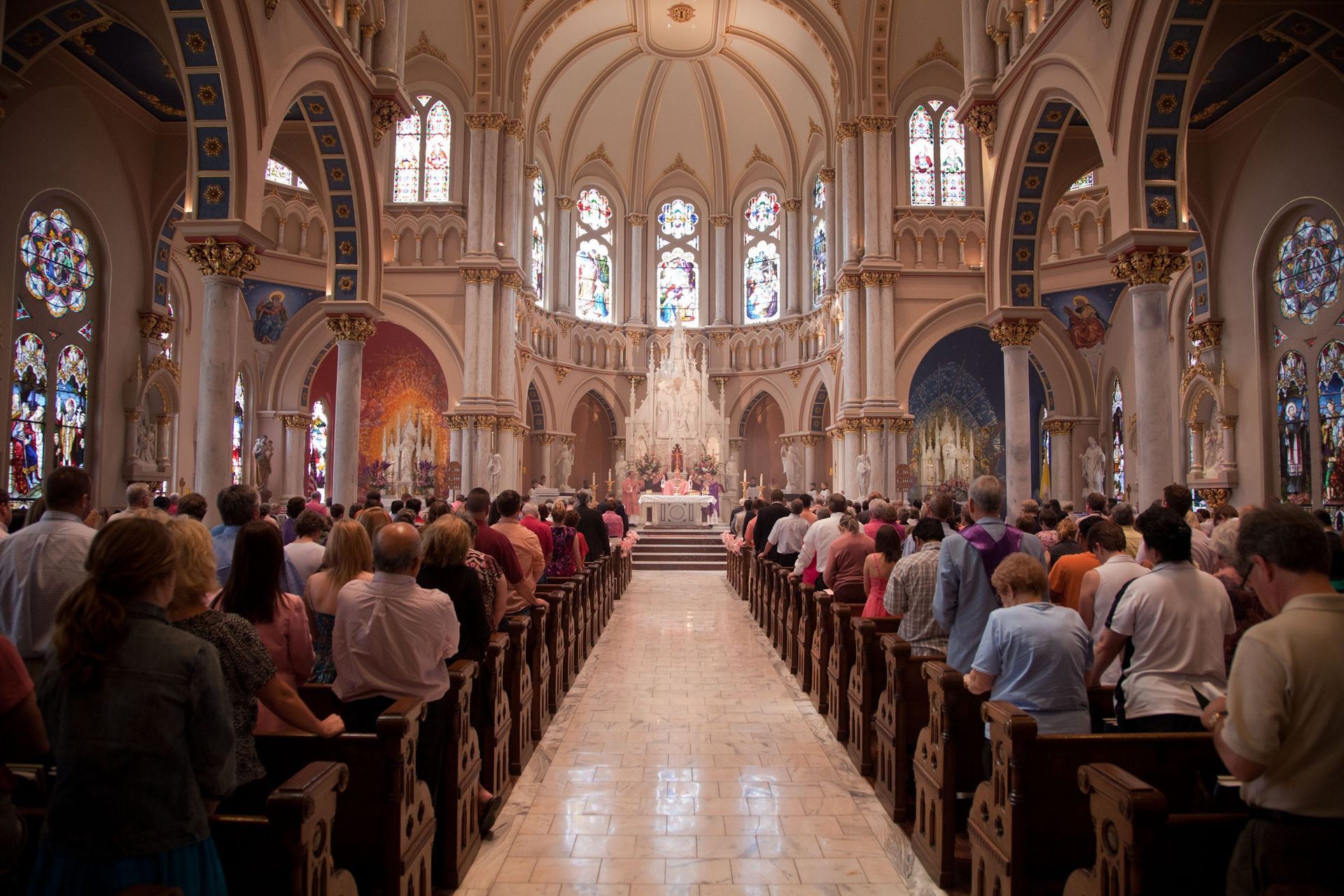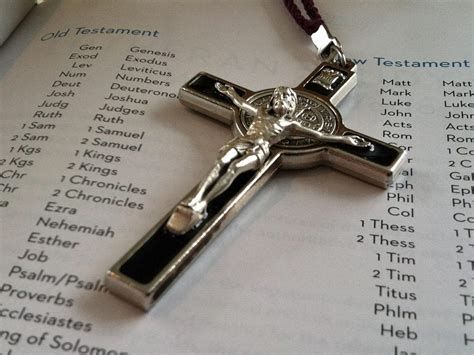Salvation
Then Peter, filled with the holy Spirit, answered them,
"...There is no salvation through anyone else, nor is there any other name under heaven given to the human race by which we are to be saved.”
Salvation (in Greek soteria, in Hebrew yeshu’-ah) has in Scriptural language the general meaning of liberation from straitened circumstances or from other evils, and of a translation into a state of freedom and security ( 1 Samuel 11:13 ; 14:45 ; 2 Samuel 23:10 ; 2 Kings 13:17 ). At times it expresses God's help against Israel's enemies, at other times, the Divine blessing bestowed on the produce of the soil (Isaiah 45:8 ).
As sin is the greatest evil, being the root and source of all evil, Sacred Scripture uses the word "salvation" mainly in the sense of liberation of the human race or of individual man from sin and its consequences.
We shall first consider the salvation of the human race, and then salvation as it is verified in the individual man.
Salvation of the Human Race
We need not dwell upon the possibility of the salvation of mankind or upon its appropriateness. Nor need we remind the reader that after God had freely determined to save the human race, He might have done so by pardoning man's sins without having recourse to the Incarnation of the Second Person of the Most Holy Trinity. Still, the Incarnation of the Word was the most fitting means for the salvation of man, and was even necessary, in case God claimed full satisfaction for the injury done to him by sin.
Though the office of Saviour is really one, it is virtually multiple:
- there must be an atonement for sin and damnation,
- an establishment of the truth so as to overcome human ignorance and error,
- a perennial source of spiritual strength aiding man in his struggle against darkness and concupiscence.
There can be no doubt that Jesus Christ really fulfilled these three functions, that He therefore really saved mankind from sin and its consequences.
As teacher, He established the reign of truth ; as king, He supplied strength to His subjects; as priest, He stood between heaven and earth, reconciling sinful man with his angry God.
A. Christ as Teacher
Prophets had foretold Christ as a teacher of Divine truth : "Behold, I have given him for a witness to the people, for a leader and a master to the Gentiles " ( Isaiah 55:4 ). Christ himself claims the title of teacher repeatedly during the course of His public life: "You can call me Master, and Lord; and you say well, for so I am" ( John 13:13 ; cf. Matthew 23:10 ; John 3:31 ). The Gospels inform us that nearly the whole of Christ's public life was devoted to teaching ( see JESUS CHRIST ). There can be no doubt as to the supereminence of Christ's teaching; even as man, He is an eyewitness to all He reveals; His truthfulness is God's own veracity; His authority is Divine; His words are the utterance of a Divine person ; He can internally illumine and move the minds of His hearers; He is the eternal and infinite wisdom of God Incarnate Who cannot deceive and cannot be deceived.
B. Christ as King
The royal character of Christ was foretold by the Prophets, announced by the angels, claimed by Christ Himself (Psalm 2:6 ; Isaiah 9:6-7 ; Ezekiel 34:23 ; Jeremiah 23:3-5 ; Luke 1:32-33 ; John 18:37). His royal functions are the foundation, the expansion and the final consummation of the kingdom of God among men. The first and last of these acts are personal and visible acts of the king, but the intermediate function is carried out either invisibly, or by Christ's visible agents. The practical working of the kingly office of Christ is described in the treatises on the sources of revelation; on grace, on the Church, on the sacraments, and on the last things.
C. Christ as Priest
The ordinary priest, is made God's own by an accidental unction, Christ is constituted God's own Son by the substantial unction with the Divine nature; the ordinary priest is made holy, though not impeccable, by his consecration, while Christ is separated from all sin and sinners by the hypostatic union ; the ordinary priest draws nigh unto God in a very imperfect manner, but Christ is seated at the right hand of the power of God. The Levitical priesthood was temporal, earthly, and carnal in its origin, in its relations to God, in its working, in its power; Christ's priesthood is eternal, heavenly, and spiritual. The victims offered by the ancient priests were either lifeless things or, at best, irrational animals distinct from the person of the offerer; Christ offers a victim included in the person of the offerer. His living human flesh, animated by His rational soul, a real and worthy substitute for mankind, on whose behalf Christ offers the sacrifice. The Aaronic priest inflicted an irreparable death on the victim which his sacrificial intention changed into a religious rite or symbol; in Christ's sacrifice the immutation of the victim is brought about by an internal act of His will ( John 10:17 ), and the victim's death is the source of a new life to himself and to mankind. Besides, Christ's sacrifice, being that of a Divine person, carries its own acceptance with it; it is as much of a gift of God to man, as a sacrifice of man to God.
Individual Salvation
The Council of Trent describes the process of salvation from sin in the case of an adult with great minuteness (Sess. VI, v-vi).
It begins with the grace of God which touches a sinner's heart, and calls him to repentance. This grace cannot be merited; it proceeds solely from the love and mercy of God. Man may receive or reject this inspiration of God, he may turn to God or remain in sin. Grace does not constrain man's free will.
Thus assisted the sinner is disposed for salvation from sin; he believes in the revelation and promises of God, he fears God's justice, hopes in his mercy, trusts that God will be merciful to him for Christ's sake, begins to love God as the source of all justice, hates and detests his sins.
This disposition is followed by justification itself, which consists not in the mere remission of sins, but in the sanctification and renewal of the inner man by the voluntary reception of God's grace and gifts, whence a man becomes just instead of unjust, a friend instead of a foe and so an heir according to hope of eternal life. This change happens either by reason of a perfect act of charity elicited by a well disposed sinner or by virtue of the Sacrament either of Baptism or of Penance according to the condition of the respective subject laden with sin. The Council further indicates the causes of this change. By the merit of the Most Holy Passion through the Holy Spirit , the charity of God is shed abroad in the hearts of those who are justified.
Against the heretical tenets of various times and sects we must hold
- that the initial grace is truly gratuitous and supernatural;
- that the human will remains free under the influence of this grace;
- that man really cooperates in his personal salvation from sin;
- that by justification man is really made just, and not merely declared or reputed so;
- that justification and sanctification are only two aspects of the same thing, and not ontologically and chronologically distinct realities;
- that justification excludes all mortal sin from the soul, so that the just man is no way liable to the sentence of death at God's judgment-seat.
Other points involved in the foregoing process of personal salvation from sin are matters of discussion among Catholic theologians; such are, for instance,
- the precise nature of initial grace,
- the manner in which grace and free will work together,
- the precise nature of the fear and the love disposing the sinner for justification,
- the manner in which sacraments cause sanctifying grace.
But these questions are treated in other articles dealing ex professo with the respective subjects. The same is true of final perseverance without which personal salvation from sin is not permanently secured.
What has been said applies to the salvation of adults; children and those permanently deprived of their use of reason are saved by the Sacrament of Baptism.
How Are We Saved?
From the article, "How Are We Saved?" written by Brian Strassburger, SJ.
“Have you been saved?” Picture yourself seated next to someone on a flight. Before you can get your headphones in, they lean towards you and ask the question. “Have you been saved?” If you’re like me in this scenario, you give a quick “oh, yes, thank you,” and then throw those earbuds in as quick as you can and close your eyes for the duration of the flight.
But it is a question worth pondering over. Have we been saved? What does it mean to be saved? And what does the Church teach about salvation?
Given the plethora of Church teaching, you might be shocked to find out: the Catholic Church does NOT endorse one particular understanding of salvation. (Gasp!) It’s shocking, I know.
That’s not to say that the Church doesn’t have a lot to say about our salvation and how it is worked out. It does! But as much as we seek to uncover truth, we also have to understand the mystery of God’s work in our life and in our world as well. It’s too large a task to explore the entirety of Church teaching on salvation, but this article will offer a few helpful insights to reflect on.
********
There is one central dogmatic truth of salvation that has been upheld by the Church: the rejection of Pelagianism. What is that exactly? Pelagianism is a 5th century heresy from the theologian Pelagius. Let’s not hate on him too much- he had good intentions (as most ancient heretics did).
Pelagius was concerned about the low moral standards among Christians of his time, and he wanted to stress the essential goodness of human nature and the freedom of human will. He was so optimistic about human capacity to choose good (and evil) that he believed we have the freedom to earn our salvation by our own efforts. In other words, according to Pelagius, we can save ourselves.
That might sound reasonable. We can pull ourselves up by our own bootstraps, right? Well, when it comes to our salvation, that’s just wrong.
The Church has definitively rejected Pelagianism and the proposal that we save ourselves. Pope Francis summarized this teaching succinctly in his apostolic exhortation Gaudete et Exsultate, “The Church has repeatedly taught that we are justified not by our own works or efforts, but by the grace of the Lord, who always takes the initiative” (§52).
Our salvation doesn’t come from our own efforts. It begins with God, who always takes the initiative.
Catholic understanding of salvation must be firmly rooted in the fullness of God’s revelation in Jesus and the salvific work of his Life, Death, and Resurrection.
We profess in the Nicene Creed that Jesus came “for us…and for our salvation.” Okay, so salvation is all about Jesus. That’s the essential starting point. But there are lots of ways to go from there.
How exactly does Christ save us? The creed does not elaborate on any particular model of salvation. Consequently, a variety of models exist from different theologians who have tried to make sense of this complicated concept. Many of these models overlap and can be seen as complementary rather than mutually exclusive.
But some models of salvation are not helpful and can have a deep impact on our images of God and our understanding of how we relate to God. One such model, which continues to be prevalent in our thinking, is the penal substitution model. Gerald O’Collins, SJ, summarizes it like this: “Christ was a penal substitute who was personally burdened with the sins of humanity, judged, condemned, and deservedly punished in our place. Thus through his death he satisfied the divine justice, paid the required price, and propitiated an angry God.” Basically, Jesus was the sacrificial offering who bore all of our sins and died to appease an angry God.
This is not a helpful image of God. The penal substitution model portrays a vengeful God tracking our offenses and demanding recompense. Living out of this image impacts how we relate to God: we can become consumed by guilt and fear before God, like he’s a highway patrol officer waiting to catch us doing something wrong, throw us in prison, and punish us.
But the image of God from the parable of the prodigal son (Luke 15:11-32), for example, portrays a very different God: a God who is loving and who shows abundant mercy. Rather than demanding recompense, the merciful father in the parable embraces and kisses his son and celebrates his return with a feast. It’s a drastically different image of God than the penal substitution model.
So what does Jesus’ life reveal to us about our salvation?
Since salvation is rooted in Christ, what we understand about Christ’s work of salvation comes directly from what we know about Christ, including who he is and what happened during his life. There are three major moments in Jesus’ life that models of salvation often turn to: Jesus’ birth, death, and resurrection. Let’s consider the importance of those three moments.
Jesus' Birth
First, in the Incarnation, Jesus was born into our world. From the earliest councils, the Church has affirmed Christ’s divinity (“God from God…consubstantial with the father”) and Christ’s humanity (“he became man”). That is to say, Jesus is both fully human and fully divine.
This truth about Jesus is fundamental to our understanding of how he enacted salvation for all people. Peter Bouteneff explains the importance: “A mere human being can die voluntarily for others to great effect, but he or she is not the saviour of the world. And the ‘voluntary’ suffering and death of Jesus, if he had no human life, soul, passions or vulnerability, would be mere play-acting.” Thus, our salvation needs to come from someone who is authentically one of us (fully human). But it also has to come from God, who is much greater than us (fully divine). This is realized in the person of Jesus.
Christ's Death
Second, we also profess that Christ “was crucified under Pontius Pilate, he suffered death and was buried.” All four Gospel accounts affirm Christ’s crucifixion, despite the great scandal of this brutal and torturous death. Jewish messianic expectations, arising from the Hebrew Bible, awaited a new ruler from the line of David who would deliver the Jewish people from oppression. Jesus’s Passion ran counter to these expectations, and St. Paul writes about this apparent contradiction: “we proclaim Christ crucified, a stumbling block to Jews and foolishness to Gentiles” (1 Corinthians 1:23). Any model of salvation must account for the reality of Jesus’s crucifixion and unpack its implications on our salvation.
Christs' Resurrection
Third, Jesus’s life did not end with his death, for we also profess that he “rose again on the third day.” While the exact accounts differ in the Gospels, the underlying story is the same. N.T. Wright summarizes it: “the body of Jesus was neither resuscitated nor left to decay in the tomb but was rather transformed into a new mode of physicality, shocking and startling to the disciples and all subsequent readers.” The reality of Jesus’s resurrection cannot be ignored. In fact, it is revelatory of our own salvation. We profess our belief in the “resurrection of the body,” which means that our salvation will be more than just a spiritual resurrection. It will entail the resurrection of both our body and soul. Just like Jesus’.
Thus, the Resurrection, together with the Incarnation and Passion, clearly need to be foundational to our understanding of Christ’s work of salvation.
********
What do the rest of Scriptures have to say about salvation?
It can be helpful to look to New Testament sources to get a sense of how early Christians talked about Christ’s death and resurrection and its implications in our salvation.
In his letter to the Romans, Saint Paul writes: “Now there is no condemnation for those who are in Christ Jesus. For the law of the spirit of life in Christ Jesus has freed you from the law of sin and death” (Romans 8:1-2). Jesus’s death and resurrection bring us deliverance from sin and death, which no longer have a final claim on us. “Death is swallowed up in victory. Where, O death, is your victory? Where, O death, is your sting?” (1 Corinthians 15:54-55).
Death and sin are conquered by Christ, and we are brought into new life through him and with him. “If the Spirit of the one who raised Jesus from the dead dwells in you, the one who raised Christ from the dead will give life to your mortal bodies also” (Romans 8:11). We share in the redemption of new life together with Christ.
Sounds great, doesn’t it? Only one problem. Sin, death, and evil continue to exist in our world as evidenced by the violence, poverty, and division that continue to afflict humanity.
Thus, we have to find a balance between our understanding of the liberation already achieved by Jesus’s death and resurrection and the fullness of redemption which is clearly not yet here. St. Paul expresses this as he writes: “we ourselves, who enjoy the firstfruits of the Spirit, we also groan within ourselves as we wait for adoption, the redemption of our bodies. For in hope we were saved” (Romans 8:23-24).
The working out of our salvation through Jesus’s death and resurrection remains a mystery, but it must hold in tension both the already and the not yet of salvation.
********
There are too many models of salvation to elaborate on in an introductory article. Let me conclude by introducing one other essential component to the conversation: love.
Jesus is the fullness of the revelation of God. And Jesus reveals the love of God: “For God so loved the world that he gave his only Son, so that everyone who believes in him might not perish but might have eternal life. For God did not send his Son into the world to condemn the world, but that the world might be saved through him” (John 3:16-17).
This should matter when we think about how our salvation is achieved through Christ.
Love is the central message of the Incarnation for it is the very reason God took flesh. Love is the central message of Jesus’s life and teaching, as evident by the parable of the prodigal son, the parable of the workers in the vineyard (Matthew 20:1-16), and the story of the woman caught in adultery (John 8:1-11). Love is the central message of the Cross: “God proves his love for us in that while we were still sinners Christ died for us” (Romans 5:8). And love is the central message of the Resurrection, as the disciples who encounter Jesus on the road to Emmaus remark to each other, “Were not our hearts burning within us while he spoke to us on the way?” (Luke 24:32)
The Incarnation, life, death, and resurrection of Jesus all reveal God to us, and “God is love” (1 John 4:16). God is revealed to us, and sin and death no longer hold claim over us, as we hold in tension the already and not yet of our salvation. As St. Paul tells us, the evils of this world, whether anguish, distress, persecution, famine, nakedness, peril, or the sword, cannot separate us from the love of Christ (Romans 8:35-39).
We cannot be separated from the love of God in Jesus, and, by the teaching and example of Jesus’s life, we come to know the proper way of responding to God, which is a response of love. This response of love to God and others is a manner of living out of the grace freely given to us by God, for we do not, by our own efforts, earn our salvation. (Sorry, Pelagius.)
The precise manner in which our salvation is worked out through Jesus’s revelation of God and God’s divine love for humanity remains a mystery. Jon Sobrino writes, “This affirmation does not ‘explain’ anything, but it says everything. In Jesus’ life and cross, God’s love has been displayed. And God chose this way of showing himself, because he could not find any clearer way of telling us human beings that he really wills our salvation.”
It is precisely this dynamic of contemplating God’s love and our own response that comprise the final crescendo of Saint Ignatius’s “Spiritual Exercises.” As he invites the retreatant to reflect, he reminds us that “love consists in interchange between two parties,” and “love ought to be put more in deeds than in words.” Jesus’s life, death, and resurrection reveal God’s love for us and thereby save us from sin and death, and our only proper response is to return that love to God by our words and actions.
In this, we find our salvation.
About the author of this article...Brian was ordained a priest in June 2021. He is currently working in the diocese of Brownsville, TX on the US-Mexico border. Brian grew up in Denver, CO, and went to Regis Jesuit High School followed by college at Saint Louis University. As a Jesuit, he studied International Development at Fordham University, which inspired two and half years working at a Jesuit nonprofit in Managua, Nicaragua. After theology studies at Boston College, Brian was ordained and sent to a new mission of his province on the border. He helps at a local parish in Brownsville, accompanies migrants on both sides of the border, and co-hosts The Jesuit Border Podcast.
Must a person be a member of the Church in order to be saved?
"Whoever believes and is baptized will be saved; whoever does not believe will be condemned."
(Mark 16:16)
"Whoever eats my flesh and drinks my blood has eternal life, and I will raise him on the last day."
(John 6:54)
All salvation comes through Jesus Christ and the Catholic Church founded by Christ, regardless of whether the saved person is a member of that Church. Christ has willed to bestow the merits of his redemption through his Church. The two Scripture references above point to the necessity of the Sacraments of Baptism, Penance, and the Eucharist. Therefore, as the Body of Christ, the Church is "the way" of salvation. This is why she is also called the "Sacrament of Salvation." (Cf. CCC 776, 849, 1111)
The phrase "outside the Church there is no salvation" ("Extra Ecclesiam nulla salus") was first coined by Saint Cyprian, Bishop of Carthage, in the third century. This traditional teaching was further clarified by Pope Bl. Pius IX (cf. Allocution of December 9,1854). While emphasizing that all salvation comes from Christ through the Catholic Church, Bl. Pius taught that God does not impute guilt to those who are innocently unaware of the truth of the Catholic Church. Those who are not aware of the truths of the Church through no fault of their own may attain salvation if they are seeking the truth and try to live according to the truth. People invincibly ignorant of the truth of the Catholic Church are expected to follow the natural law that is written on the hearts of all people (cf. Lumen Gentium 16; cf. DS 3866-3872). God binds salvation to Baptism, but he himself is not bound by his Sacraments. (Cf. CCC 847,1257, 1955-1956)
It is important to remember that "all men are bound to seek the truth, especially in what concerns God and his Church, and to embrace it and hold on to it as they come to know it"
(DH1). (Cf. CCC 2104, 2467)
The possibility that people who have never heard the Gospel can be saved does not excuse Catholics from fulfilling their role in the evangelical mission of the Church. Everyone has the right to hear the truth, and Christ instructed his Apostles to preach to and make disciples of all people. Without the Sacraments and the guidance of the teaching authority established by Christ, those who do not hear the Gospel are at a decided disadvantage as far as the pursuit of truth and holiness is concerned. This reality makes it all the more urgent that we lead others, by our word and example, toward full union with our Lord through the Church. For this reason, the Church has always held her missionary role as an essential priority. (Cf. CCC 848-856)
The Catechism of the Catholic Church, paragraph 846 addresses this question.
-The Didache Bible
The Sacraments
The Catholic Church has recognized and defined seven sacraments - instituted by and through the life of Jesus Christ. It is through the experience of the sacramental ritual that we are infused with God’s grace.








